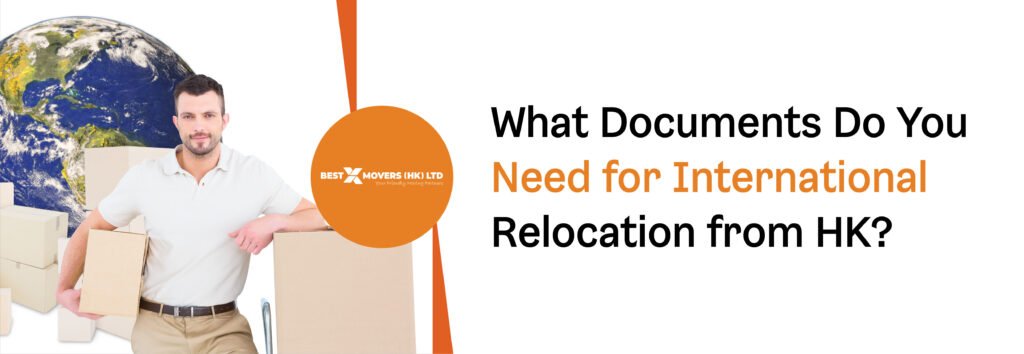What Documents Do You Need for International Relocation from HK?
International Relocation from HK: Complete Document Checklist for Moving Abroad Introduction Planning an international relocation from HK can feel overwhelming, especially when it comes to gathering all the necessary documents. Whether you’re moving for work, family, or lifestyle reasons, having the right paperwork ready is crucial for a smooth transition. This comprehensive guide will walk you through every document you’ll need for your international relocation from HK, ensuring you’re fully prepared for your move abroad. At Best Movers HK, we understand that proper documentation is the foundation of any successful international move. Our team has helped thousands of families and individuals navigate the complex requirements of international moving from Hong Kong to destinations worldwide. Essential Personal Documents Passport and Travel Documents Your passport is the most important document for international relocation from HK. Ensure your passport is valid for at least six months beyond your planned departure date. Most countries require this minimum validity period for entry. Key requirements: Identity Documents Beyond your passport, you’ll need various identity documents depending on your destination country: Pro Tip: Get multiple certified copies of all identity documents, as different agencies may require original copies. Apostille and Authentication Many countries require documents to be apostilled or authenticated by the Hong Kong government. This process verifies the authenticity of your documents for use abroad. Documents commonly requiring apostille: Immigration and Visa Documents Visa Applications Your visa application is central to your international relocation from HK. Different countries have varying visa requirements based on your purpose of travel. Common visa types: Supporting Documentation for Visas Each visa type requires specific supporting documents: Work Visa Requirements: Student Visa Requirements: Immigration Forms and Applications Complete all immigration forms accurately and submit them with required supporting documents. Common forms include: Financial Documents Bank Statements and Financial Records Financial documentation proves your ability to support yourself during your international relocation from HK and beyond. Essential financial documents: Tax Documentation Tax compliance is crucial for international relocation from HK. Gather these tax-related documents: Insurance Documents Insurance coverage is often mandatory for visa applications and provides essential protection during your move: Medical Records and Health Documents Health Certificates and Medical Examinations Most countries require medical examinations for international relocation from HK, especially for long-term stays. Required medical documents: Vaccination Requirements Different countries have specific vaccination requirements: Health Insurance Proof of health insurance coverage is often required: Employment-Related Documents Professional Qualifications Your career credentials are essential for international relocation from HK when seeking employment abroad. Professional documentation: Work Authorization Depending on your destination, you may need: Employment Contracts If you have secured employment before your move: Property and Asset Documents Property Ownership Documents If you own property in Hong Kong or plan to purchase property abroad: Asset Transfer Documentation For moving financial assets internationally: Children’s Documents Educational Records If relocating with children, gather their educational documents: Legal Documents for Minors Additional requirements for children include: Legal Documents Power of Attorney You may need to grant power of attorney for affairs remaining in Hong Kong: Legal Compliance Ensure all legal obligations are met: Country-Specific Requirements Popular Destinations from Hong Kong Different countries have unique requirements for international relocation from HK: United States: Canada: Australia: United Kingdom: Regional Considerations Consider regional factors that may affect your document requirements: Document Preparation Tips Organization and Copies Proper organization is crucial for successful international relocation from HK: Translation Requirements Many documents require certified translations: Timeline Planning Start document preparation early: Common Mistakes to Avoid Documentation Errors Avoid these common mistakes during your international relocation from HK: Timing Issues Plan your timeline carefully: Professional Assistance Consider professional help when needed: Working with experienced professionals like Best Movers HK can help ensure your international relocation from HK goes smoothly. Our team understands the documentation requirements for various destinations and can guide you through the process. Document Security Protect your important documents: Conclusion Successful international relocation from HK requires careful preparation and attention to documentation requirements. By following this comprehensive guide, you’ll be well-prepared for your move abroad. Remember that requirements can vary significantly between countries, so always verify specific requirements for your destination. The key to smooth international relocation from HK is starting early, staying organized, and seeking professional assistance when needed. With proper documentation and planning, your international move can be a positive and exciting experience. For expert assistance with your international relocation from HK, contact Best Movers HK today. Our experienced team can help you navigate the complex documentation requirements and ensure your move goes smoothly from start to finish. Ready to start your international relocation from HK? Contact us for a consultation and let our experts guide you through every step of the process, from document preparation to final delivery at your new destination.



